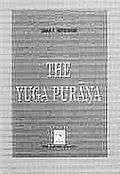Yuga Purana

The Yuga Purana is a Sanskrit text and the last chapter of a Jyotisha (astrology) text Vriddhagargiya Samhita.[1] It is also considered a minor text in the Puranic literature.[2]
Characteristics
The extant manuscripts of the Yuga Purana are in poor form and considered by scholars as highly corrupted over its history.[3] It importance is contested, with claims ranging from possibly the "oldest surviving text" with Purana in its title, to "quite late and worthless" manuscript.[4] The few manuscripts discovered are highly inconsistent, and early 20th-century translators reconstructed the manuscript by "liberally altering" proper names in the text to arrive at "guesses at truth" that these manuscripts might have intended.[5]
The Yuga Purana is structured as a chronicle, and is notable for historical information. It is the only surviving Indian text that includes a description of Greeks who advanced into India after arriving with Alexander the Great, and several Indo-Greek rulers of the ancient Indian history.[3][6][7]
It includes mythology, but also chronicles Magadha empire, the Sungas and the Sakas.[3] The Indo-Greek record is however described in the style of a "prophecy" (future tense), as if the text was written before recorded human history began.[8] Fleet in 1912, and later William Tarn, state that this text is a late text and dismiss the Yuga Purana as historically worthless, with Tarn adding that "naturally, I cannot be sure".[9][10]
John Mitchiner suggests it to be one of the useful, important and oldest Purana giving it an estimate of 250 CE because of the archaic, unusual Sanskrit found in the text.[11] Mitchiner notes that the manuscripts themselves were likely copied from their sources in 18th or 19th century.[12] A few scholars place the origin of this astrology-related text to between 1st century BCE to 3rd century CE.[13] Other scholars suggest that this text is written with a mix of Prakrit and Sanskrit languages, but attribute this to "extreme corruption" of the text.[3] There is no consensus on an acceptable version of the text.[3]
Contents of the Yuga Purana
D. The Yavana incursion.
The invasion of the Yavana (Indo-Greeks) is described in a rather detailed account:[6]
- "After having conquered Saketa, the country of the Panchala and the Mathuras, the Yavanas, wicked and valiant, will reach Kusumadhvaja ("The town of the flower-standard", Pataliputra). The thick mud-fortifications at Pataliputra being reached, all the provinces will be in disorder, without doubt. Ultimately, a great battle will follow, with tree-like engines (siege engines)." (Gargi-Samhita Paragraph 5, Yuga Purana.)[7]
- "The Yavanas (Greeks) will command, the Kings will disappear. (But ultimately) the Yavanas, intoxicated with fighting, will not stay in Madhadesa (the Middle Country); there will be undoubtedly a civil war among them, arising in their own country (Bactria), there will be a terrible and ferocious war." (Gargi-Samhita, Yuga Purana chapter, No7).[7]
E. Seven kings of Saketa.
After the departure of the Yavana, the Yuga Purana explains that seven kings ruled in the area of Saketa.
I. The Saka incursion and defeat.
The Yuga Purana describes a powerful Saka king raiding Pushpanama (Pataliputra), where he kills a quarter of the population. He is later killed by the king of Kalinga Shata and a group of Sabalas (Savaras).
References
- ↑ Rocher 1986, p. 253.
- ↑ Mitchiner 2002.
- 1 2 3 4 5 Rocher 1986, pp. 253-254.
- ↑ Rocher 1986, p. 254 with footnotes.
- ↑ William Woodthorpe Tarn (2010). The Greeks in Bactria and India. Cambridge University Press. pp. 454–455. ISBN 978-1-108-00941-6.
- 1 2 A Comprehensive History Of Ancient India, Sterling Publishers Pvt. Ltd, 2003, p.90
- 1 2 3 The Sungas, Kanvas, Republican Kingdoms and Monarchies, Mahameghavahanas, Dilip Kumar Chakrabarti, p.6
- ↑ William Woodthorpe Tarn (2010). The Greeks in Bactria and India. Cambridge University Press. pp. 452–456. ISBN 978-1-108-00941-6.
- ↑ Rocher 1986, p. 254 with footnote 534.
- ↑ William Woodthorpe Tarn (2010). The Greeks in Bactria and India. Cambridge University Press. p. 453. ISBN 978-1-108-00941-6.
- ↑ Yuga Purana, J Mitchiner (Translator), pages vii-viii, 3-5, 81-82
- ↑ Yuga Purana, J Mitchiner (Translator), pages 22-24
- ↑ Rocher 1986, p. 254.
Bibliography
- Rocher, Ludo (1986). The Puranas. Otto Harrassowitz Verlag. ISBN 978-3447025225.
- Mitchiner, John E. (2002). "The Yuga Purana. Reprint. Kolkata, The Asiatic Society. ISBN 81-7236-124-6.
External links
- Yuga Purana, J Mitchiner